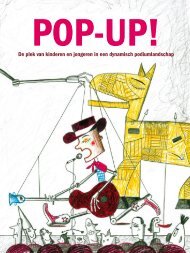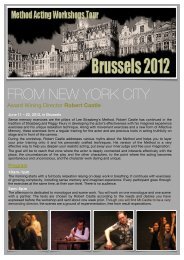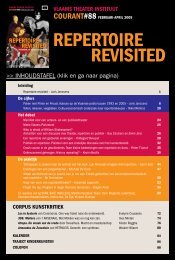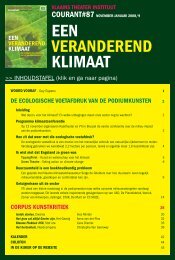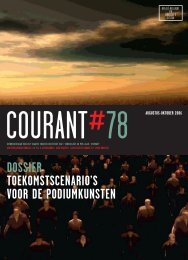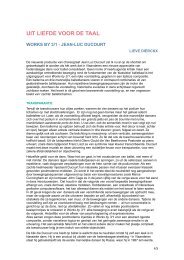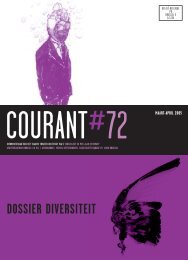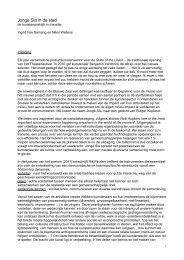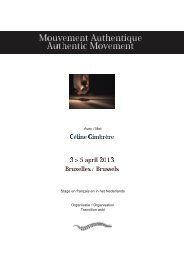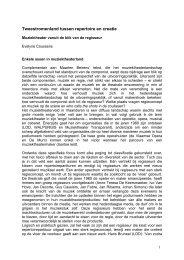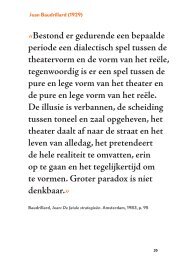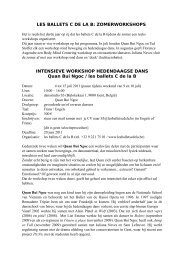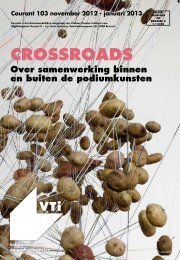music theatre in flanders - Muziekcentrum Vlaanderen
music theatre in flanders - Muziekcentrum Vlaanderen
music theatre in flanders - Muziekcentrum Vlaanderen
You also want an ePaper? Increase the reach of your titles
YUMPU automatically turns print PDFs into web optimized ePapers that Google loves.
at all? The borderl<strong>in</strong>es between the traditional sub-discipl<strong>in</strong>es<br />
are constantly shift<strong>in</strong>g, both artistically and <strong>in</strong>stitutionally. Will a<br />
separate <strong>music</strong> <strong>theatre</strong> advisory committee apply other criteria<br />
and another frame of reference than for the ‘other’, <strong>in</strong>creas<strong>in</strong>gly<br />
hybrid, performances? Elsewhere <strong>in</strong> this booklet, Pieter Verstraete<br />
writes: ‘As a result of the explosion of multimedia and new<br />
multidiscipl<strong>in</strong>ary forms of <strong>music</strong> <strong>theatre</strong>, it has become extremely<br />
difficult for an advisory committee to apply an ultimate def<strong>in</strong>ition<br />
as a standard’. Moreover, Metamorphoses revealed that the evolution<br />
<strong>in</strong>creas<strong>in</strong>gly obscures the position of organizations that<br />
cont<strong>in</strong>uously diversify their activities <strong>in</strong> relation to the subgenres<br />
of the perform<strong>in</strong>g arts, mak<strong>in</strong>g it <strong>in</strong>creas<strong>in</strong>gly difficult for them to<br />
submit the entirety of the operations to one s<strong>in</strong>gle specific subdiscipl<strong>in</strong>ary<br />
advisory committee.<br />
As a result, the question about the specific identity of a <strong>music</strong><br />
<strong>theatre</strong> sub-sector with<strong>in</strong> the perform<strong>in</strong>g arts at least demands<br />
further consideration. What once was a clearly def<strong>in</strong>ed, separate<br />
sector today seems to merge <strong>in</strong>to a larger entity. To which extent<br />
could this be a problem? Is this confusion productive or does<br />
it have a paralyz<strong>in</strong>g effect <strong>in</strong>stead? Does it generate new dynamism<br />
– because it makes cross-fertilization between previously<br />
separate sectors possible (renowned <strong>theatre</strong> directors who now<br />
venture <strong>in</strong>to opera or <strong>music</strong> <strong>theatre</strong>, for <strong>in</strong>stance)? Or could it be<br />
that a specific expertise – the comb<strong>in</strong>ation of <strong>music</strong>al and theatrical<br />
elements <strong>in</strong>to one consistent theatrical entity – is no longer<br />
recognized as such?<br />
Joris Janssens is researcher at VTi.<br />
claim<strong>in</strong>g <strong>music</strong> for the <strong>theatre</strong><br />
aBoUT deFInITIons BeTWeen cUlTUral PolIcy and<br />
arTIsTIc ForMs<br />
Pieter Verstraete<br />
It would not be entirely appropriate to claim that <strong>music</strong> <strong>theatre</strong><br />
has def<strong>in</strong>ed itself <strong>in</strong>dependently from <strong>theatre</strong> and opera. Whoever<br />
takes a glance at <strong>music</strong> <strong>theatre</strong> <strong>in</strong> Flanders will immediately<br />
notice a rich variety of cross-over forms, some <strong>in</strong>cl<strong>in</strong><strong>in</strong>g towards<br />
<strong>theatre</strong>, others towards opera. In fact, the diversity is so strik<strong>in</strong>g<br />
that it would appear as if <strong>music</strong> <strong>theatre</strong> escapes def<strong>in</strong>ition.<br />
However, <strong>music</strong> <strong>theatre</strong> has struggled long to legitimize itself<br />
by means of a def<strong>in</strong>ition that opposes it to certa<strong>in</strong> text-based<br />
<strong>theatre</strong> and opera traditions. As an <strong>in</strong>ternational phenomenon it<br />
has been referred to as ‘new’ or ‘small-scale <strong>music</strong> <strong>theatre</strong>’, as<br />
opposed to large-scale opera. This ‘small-scale’ label, which <strong>music</strong><br />
<strong>theatre</strong> took on <strong>in</strong> its underdog position dur<strong>in</strong>g the 1980s, now<br />
seems to dissolve <strong>in</strong>creas<strong>in</strong>gly among cont<strong>in</strong>uously grow<strong>in</strong>g <strong>music</strong><br />
<strong>theatre</strong> ensembles such as LOD (s<strong>in</strong>ce 1989), Muziektheater<br />
Transparant (1994), and <strong>in</strong> between, Walpurgis (1989). One of the<br />
effects of this growth was an <strong>in</strong>creased awareness of <strong>in</strong>stitutionalization<br />
and <strong>in</strong>ternationalization. The question is what this development’s<br />
impact on future cultural policies will be, and how<br />
the smaller local <strong>music</strong> <strong>theatre</strong> companies will respond to this <strong>in</strong><br />
their search of an identity.<br />
40 41<br />
table of contents



